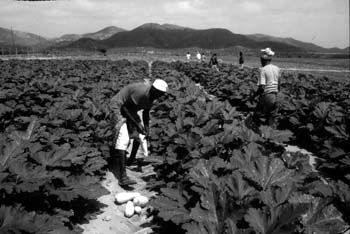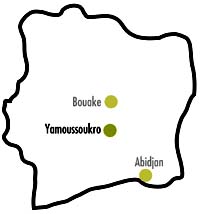
KEY FACTS
Population: 17 million
GDP per capita: US$ 907
Population below poverty line: 44%
Labour force by occupation: agriculture 68%, industry and services 32%
Total land area: 322 460 sq km, bordering the Atlantic Ocean, Burkina Faso, Ghana, Guinea, Liberia, and Mali
Total arable land: 10%
Life expectancy: male: 46 years; female: 51 years
Literacy rate: male: 57.9%; female: 43.6%
Human Development Index: 163/177
(Source: UN; World Bank; CIA Factbook)

FAO IN CÔTE D’IVOIRE
In Côte d’Ivoire, the emergency agricultural assistance carried out by FAO allowed more than 14 000 vulnerable families in 2005 to resume food crop production through the distribution of key agricultural inputs (cereal and bean seeds, vegetable seeds, tools and fertilizers). In order to improve self-reliance and resilience of the local population, an additional 1 700 farmers received training and support for the production of quality seed. Altogether the agencies involved in the agricultural support programme have assisted some 20 000 households.
Background
Côte d'Ivoire was one of West Africa's most stable and prosperous nations, but its people are now experiencing a steady decline in their living conditions. An attempted coup in 2002 turned into rebellion and has divided the country in two, causing massive population displacement and serious disruptions in socio-economic development.
The political-military crisis has persisted for three years, with nearly 600 000 IDPs, their host families and other vulnerable groups exposed to violence and the destruction of assets and property. The lack of public administration and basic social services are resulting in growing vulnerability, with humanitarian indicators pointing to a significant decrease in access to health, education, food security, as well as protection and respect of human rights. With prospects of peace ahead, the current political deadlock may lead to a stalled peace process, instability and violence, resulting in an ever-worsening humanitarian situation.
Needs analysis: Food security and agriculture sectors
Up to the present crisis, Côte d’Ivoire experienced a relatively prosperous food security situation as a result of peace and social stability, favourable agro-climatic conditions, skilled labour, good social services and infrastructure.
With the onset of the conflict in 2002, the social and economic situation of the country has changed radically. Figures from 2004 indicate that food production has fallen substantially compared to the five-year average preceding the crisis, signalling that Côte d’Ivoire will remain a food-deficit country in 2006. Conflict, displacement, plundering of agricultural products, harassment during the transportation of products, as well as a steady deterioration of roads, has left rural populations vulnerable. Insecurity is still preventing many farmers from accessing their land.
Reduced rainfall levels since 2004 and the loss of income generated by cotton production has hit northern areas. Conflict has wiped out 80 percent of livestock in central and western Côte d’Ivoire, with little improvement in 2005. Fisheries activities have been abandoned in central parts of the country.
The success of an upcoming peace process is linked to the achievements of disarmament programmes, demobilization and social reinsertion. The capacity to ensure, through agricultural support and food assistance, the food security of households involved in a reinstallation and reintegration programme, including ex-combatants and their dependents, is a prerequisite for durable peace and stability.
In 2006, FAO aims to continue to restore and safeguard crop and animal production capacity of war-affected populations. Distribution of essential inputs will enable internally displaced, vulnerable families and recent returnees to rapidly resume food crop production. The input distribution will be linked to the local production support of good quality seed, the rehabilitation of small animal production and support to fresh water fisheries and other income-generating activities. The improvement of the coordination of food security activities, including the reinforcement of information exchange with the Government and partners, will also be a focus.
PROPOSALS
FAO RELIEF AND REHABILITATION ASSISTANCE
Funding
required: US$ 3 036 000
|
Support to the coordination of emergency agricultural operations in Côte d’Ivoire |
Issues addressed: Limited funding and human resources necessitate careful coordination of operations to increase synergies and avoid duplication.
Objectives: Strengthening emergency food security coordination, food security early warning, needs assessment, provision of relief assistance and impact monitoring.
Activities: Providing technical expertise to actors engaged in agricultural assistance. Support to food security monitoring and follow-up of crop and livestock production. Facilitate needs assessments and identify vulnerable households. Improve linkage between needs assessment and response, particularly through the sharing of food security data and the setting up an inter-agency food security information system in close collaboration with all partners. Provision of agricultural assistance.
Beneficiaries: Vulnerable farmers, as well as actors engaged in agricultural emergencies and the Government of Côte d’Ivoire.
Implementing partners: Government, WFP, IOM, UNICEF, the Office for the Coordination of Humanitarian Affairs (OCHA), CICR, NGOs.
Duration: January 2006 - December 2006.
Funds requested: US$ 384 000.
|
Distribution of emergency agricultural inputs to conflict-affected vulnerable rural households |
Issues addressed: Widespread insecurity and violence has greatly increased the number of people living in extreme poverty and reduced their access to basic agricultural inputs, such as seeds, agricultural tools and fertilizers.
Objective: Reinforce the production capacity of vulnerable farmers and improve their food security through the provision of essential agricultural inputs.
Activities: Provision of a kit of key agricultural inputs, including staple crops (rice or maize), pulse crops (beans or groundnuts), vegetable seeds and a basic set of tools.
Beneficiaries: 20 000 vulnerable farmers, including IDPs, returnees, host communities, and HIV/AIDS-affected people, with priority to female-headed households.
Implementing partners: WFP, International and national NGOs, Ministry of Agriculture, Ministry of Animal Production and Fisheries.
Duration: January 2006 - December 2006.
Funds requested: US$ 1 223 000.
|
Support to the restoration of community-based seed multiplication systems |
Issues addressed: Prevailing insecurity and below average harvests in 2003, 2004 and 2005 are limiting farmers’ capacity to save their own seeds and procure additional seeds at the market. The crisis has also weakened private enterprises and public institutions in charge of production and delivery of quality seeds
Objectives: Rehabilitate quality seed production systems of the communities affected by the crisis.
Activities: Multiplication of basic cereal and pulses. Technical expertise will be provided to farmer groups and associations. Fields will be inspected and monitored for production. Particular attention will be given to harvesting, drying, cleaning, treatment, conditioning and storage of seeds.
Beneficiaries: 5 000 vulnerable households.
Implementing partners: Ministry of Agriculture, ANADER, CNRA, PNR and national NGO and community-based organizations.
Duration: January 2006 - December 2006.
Funds requested: US$ 379 000.
|
Emergency assistance to the rehabilitation of small animal production in central and western war-affected areas of Côte d’Ivoire |
Issues addressed: Conflict and consequent displacement have resulted in the almost complete decimation of small animals in western and central Côte d’Ivoire. Over 80 percent of the flocks have been wiped out.
Objectives: Enhance food security of war-affected populations through reintroduction of short cycle livestock species production.
Activities: Livestock production beneficiaries will receive feed rations and basic training as well as follow-up visits from specialized staff to improve their husbandry skills and to manage basic animal disease prevention and control.
Beneficiaries: 4 000 war-affected families.
Implementing partners: WFP, Ministry of Animal Production and Fisheries, NGOs.
Duration: January 2006 - December 2006.
Funds requested: US$ 550 000.
|
Support to income generating activities of vulnerable populations in war-affected areas of Côte d’Ivoire |
Issues addressed: A combination of the destruction and looting of property, together with a lack of maintenance on rural roads, check points and harassment, are currently hampering the trade of agricultural produce and reducing access to vulnerable populations. Limited circulation of traders and cessation of income generating activities is endangering food security.
Objectives: Improve food security of vulnerable households living in war-affected areas of the western and central regions ("confidence zone") of Côte d’Ivoire through support to off-farm income generating activities.
Activities: Providing material resources for the restoration of simple income generating activities such as food processing, fresh water fishing and support to marketing. Rehabilitate small-scale infrastructure, such as storage facilities and concrete drying grounds.
Beneficiaries: 5 000 vulnerable families.
Implementing partners: WFP, Ministry of Agriculture & Rural Development, NGOs, local communities.
Duration: January 2006 - June 2006.
Funds requested: US$ 500 000.